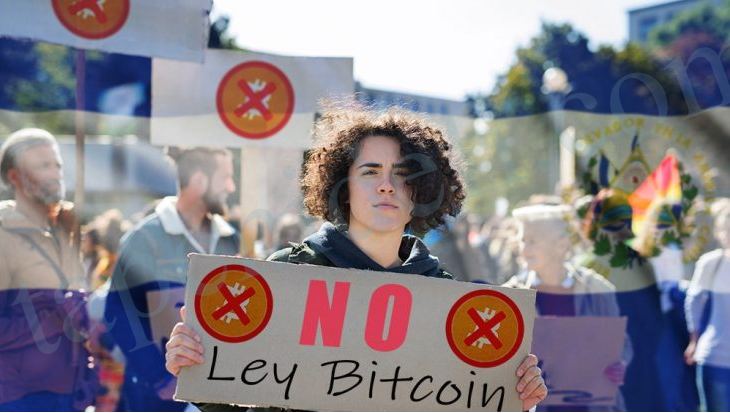El Salvadorans protested on the streets Friday against the adoption as an official currency of Bitcoin, putting it on a level with the US dollar.
Workers, veterans, and pensioners voiced their concerns about the use of cryptocurrency, especially if it would be relied on to pay for pensions and welfare instead of the US dollar.
El Salvador's lawmakers voted to adopt Bitcoin as legal tender in June, with the law taking effect on September 7.
El Salvadoran president Nayib Bukele has touted Bitcoin adoption as a way to facilitate remittance payments from those living abroad.
However, the use of cryptocurrency as legal tender has been criticized by the International Monetary Fund (IMF) for its volatility and lack of relationship with the real economy.
Stanley Quinteros, a member of the Supreme Court of Justice worker's union, said that they were concerned about the coin's drastic fluctuation, with its value uncontrollably changing from one second to another.
El Salvador's neighboring countries are waiting to see the adoption of Bitcoin as parallel legal tender reduces the cost of remittances, an important income source for millions.
Dante Mossi, the executive president of the Central American Bank for Economic Integration (CABEI), identified Guatemala, Honduras, and El Salvador as the countries that would benefit the most gain if Bitcoin adoption lowers the cost of sending remittances.
He added that if it goes well for El Salvador, other countries will probably seek its adoption, too.
Mossi dubbed the plan an "out of this world experiment" to increase financial inclusion in a region where people are bereft of bank accounts or credit cards, and rely on remittances from relatives living in the US.
CABEI's technical assistance for El Salvador on implementing the cryptocurrency is an important show of support after the World Bank declined to help due to environmental and transparency drawbacks.



 China Extends Gold Buying Streak as Reserves Surge Despite Volatile Prices
China Extends Gold Buying Streak as Reserves Surge Despite Volatile Prices  Silver Prices Plunge in Asian Trade as Dollar Strength Triggers Fresh Precious Metals Sell-Off
Silver Prices Plunge in Asian Trade as Dollar Strength Triggers Fresh Precious Metals Sell-Off  India–U.S. Interim Trade Pact Cuts Auto Tariffs but Leaves Tesla Out
India–U.S. Interim Trade Pact Cuts Auto Tariffs but Leaves Tesla Out  Dollar Steadies Ahead of ECB and BoE Decisions as Markets Turn Risk-Off
Dollar Steadies Ahead of ECB and BoE Decisions as Markets Turn Risk-Off  Russian Stocks End Mixed as MOEX Index Closes Flat Amid Commodity Strength
Russian Stocks End Mixed as MOEX Index Closes Flat Amid Commodity Strength  Gold and Silver Prices Rebound After Volatile Week Triggered by Fed Nomination
Gold and Silver Prices Rebound After Volatile Week Triggered by Fed Nomination 































